Blog
With signatures, faculty contract continues path to printer
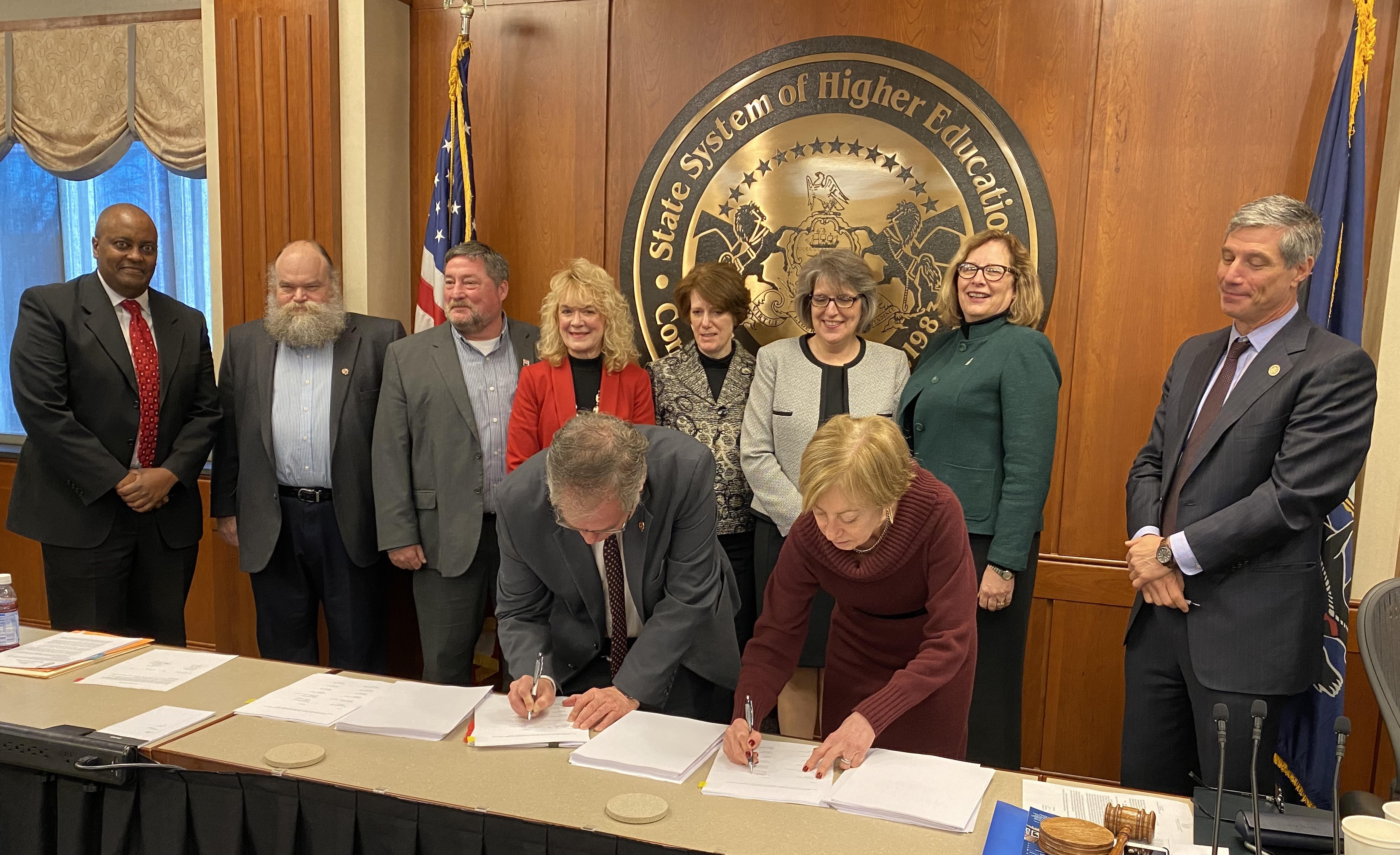
APSCUF and Pennsylvania’s State System of Higher Education negotiators today signed the 2019–23 faculty collective bargaining agreement. Signing in the above photo are APSCUF President Dr. Kenneth M. Mash, left, and State System Board of Governors Chair Cynthia Shapira. The teams assembled after this morning’s BOG meeting at Dixon University Center in Harrisburg.
We will soon send the document to the printer and will distribute contracts to members this semester. Only APSCUF members will receive printed copies; the document will be available online later. Need to join APSCUF? You can start the process here.
Thank you, negotiations team, for your work!
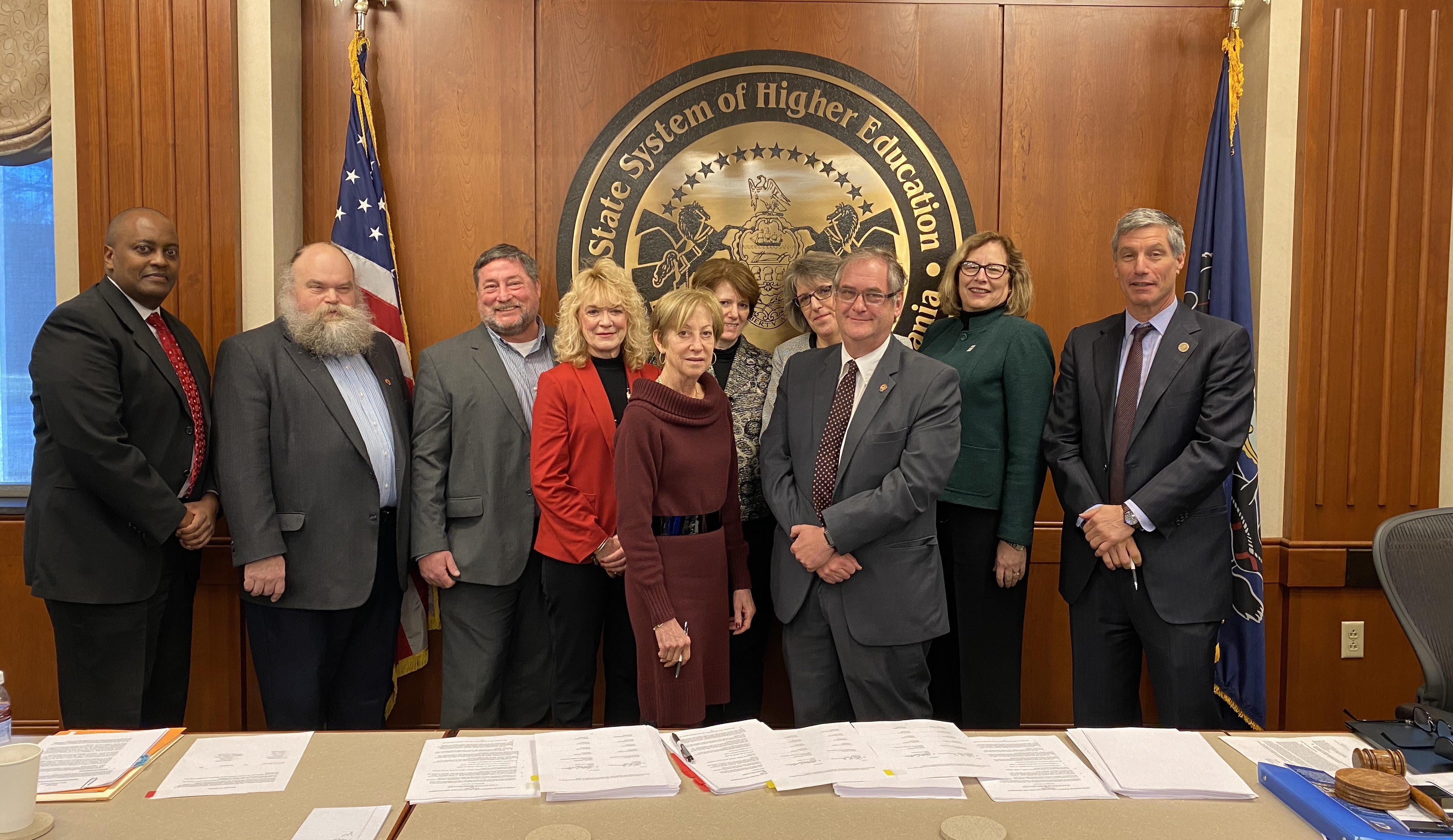
Negotiators, from left, are Brian Mbuu, assistant vice chancellor for labor relations; APSCUF Treasurer Dr. Chris Hallen, Bloomsburg University; Dr. Terry R. Barry, dean of the College of Education at East Stroudsburg University; Mary Rita Duvall, APSCUF head of labor relations; Cynthia Shapira, Pennsylvania’s State System of Higher Education Board of Governors chair; Dr. Margaret Ervin, associate professor at West Chester University; Amy Rosenberger, APSCUF negotiator; APSCUF President Dr. Kenneth M. Mash; Dr. Pamela J. Gent, provost and vice president of academic affairs at Clarion University; and State System Chancellor Daniel Greenstein. Not pictured is APSCUF Vice President Dr. Jamie Martin. Photos/Kathryn Morton
See Dr. Kenneth M. Mash’s remarks to the Board of Governors – Jan. 16, 2020
APSCUF President Dr. Kenneth M. Mash’s comments begin with some extemporaneous remarks about a faculty survey. His prepared comments begin at about 1:50. Read APSCUF President Dr. Kenneth M. Mash’s comments as prepared:
Chairwoman Shapira, governors, Chancellor Greenstein, presidents, and guests,
My name is Kenneth M. Mash, and I am the president of APSCUF, the union that represents over 5,000 faculty and coaches in our great System.
I want to take the opportunity once again to thank the chancellor and the board, and particularly the chair, for the productive contract negotiations — what I believe was and continues to be an honest attempt to start a new day of collaboration so we may all pull in the same direction and focus our attention where it should be, which is on our students.
That effort will continue in the next few weeks as we jointly will explain to administrators and faculty not only what changes have been made to the CBA but also the spirit of those changes. I know that some credit the process that we used during the negotiations, but I tend to think that our collective efforts were fruitful because of the leadership and goodwill of the individual members of the teams.
The board and the chancellor’s efforts to promote shared governance, to work collaboratively, to operate transparently, and to emphasize accountability go a long way to begin the process of changing a culture that I think almost everyone involved would agree had reached toxic levels.
However, we cannot fool ourselves. After years of distrust and bad feelings, we must all be cognizant that the ice remains thin. I have been pleased by reports from some campuses that there has been a change in approach, that administrations have reached out and become more transparent, that input is being taken seriously.
At the same time, I am disheartened by reports from other campuses, where decisions have been made — particularly decisions that impact academic quality — with little or no consultation. Or where decisions are being made that impact peoples’ lives with an air of callousness. Or where willful violations of the CBA have occurred that result in real financial cost to the university.
For many, “systemness” is a new thing. But please understand that for APSCUF systemness is not new. We have always, and I believe always will, have an understanding that what happens on one campus has an impact on others. And reports of deeds on one campus do affect the attitude of faculties across the System. How a president or a provost behaves on one campus will impact how everyone weighs the success of the project we are on.
Cultural change is a very hard thing to pull off, and it takes time. You — the board and the chancellor — have undertaken a lot at one time. To be successful, all of us need to pull in the same direction. But I hope everyone understands that cultural change must cascade down to every campus, and it must be done with the same alacrity with which we confront our financial, enrollment, and retention issues. Those harboring resentments are, by human nature, waiting to pounce on failure.
And if some of our universities do not alter the way they do business, failure will be inevitable. Not the failure of one university, but of the System. We must all do everything in our power to make certain that does not happen.
Past APSCUF president was a ‘stabilizing force’
APSCUF is mourning the loss of past President Dr. James Tinsman, who led the organization from 1986 to 1992. He died Jan. 2 at age 89. Click here to read the retired Kutztown University professor’s obituary.
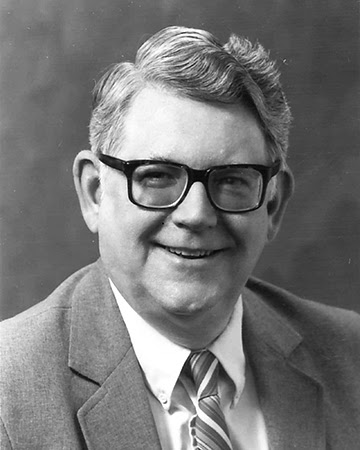
Photo: Dr. James Tinsman was president of APSCUF from 1986 to 1992. He went on to become president of APSCURF, our organization for retirees, from 1992 to 1996. File photo
“He was a stabilizing force within the organization,” said Dr. G. Terry Madonna, whose APSCUF presidency preceded Tinsman’s. “He knew what he wanted to accomplish. He reached out to people to accomplish those goals.”
Kutztown APSCUF member Kevin McCloskey noted Tinsman’s ability to connect and build relationships.
“After he retired from Kutztown U, Jim owned the rambling Used Book Store near campus,” McCloskey said. “One day … I came and saw a dapper fellow in a suit was sitting knee-to-knee with Jim chatting about the old days. It was ‘Fitz’ Dixon (founding chair of the State System Board of Governors) reminiscing with the past APSCUF president. I was impressed by how the two men clearly held each other in high esteem.”
Madonna recalled Tinsman’s qualifications for the job, including leadership at Kutztown and his involvement with the State System during its nascent days.
“The president plays a very vital role in terms of the representation of the organization to the public and particularly to the State System,” Madonna said. “Overall, I thought he handled his presidency with esteem, with a great deal of self-assurance. He wasn’t a person who panicked when there were problems. He was a problem-solver.”
In 2017, Tinsman reflected on his time at APSCUF’s helm.
“The APSCUF presidency was a most rewarding experience,” Tinsman wrote for the organization’s 80th anniversary. “The responsibility to the faculty is awesome, but certain principles stand out. This is a faculty organization, to be run by faculty whether it be budget, grievance, negotiation, or other areas. Professional unionists might be hired to assist, but the ultimate decisions are those of the faculty leadership.”
More memories
“Jim Tinsman saved my retirement. As a TIAA member in the early ’80s, the PDE was putting only about 3.5% of our earnings into TIAA, and quite frankly no one seemed that interested in helping out. Jim got to be president and pretty soon the CBA prompted the contribution to go to 9.3%. You can imagine what a difference that made. In general, the contracts negotiated on his watch were excellent in all respects as well. I only met Jim once, when he came to Shippensburg. I walked up to him and thanked him. He was very modest about his work, which is typical of the man that he was. For all he did for so many of us, he merits a well-deserved RIP.” —Bill Bassin, Shippensburg University (1970–2003)
Have a Tinsman memory to add to this post? Email it to . Please include your name and university.
Happy holidays
We wish you and your loved ones all the best during the holidays and in the new decade. The APSCUF Update newsletter will be on hiatus until Wednesday, Jan. 8. You can catch up on past editions in this password-protected area of the APSCUF website.
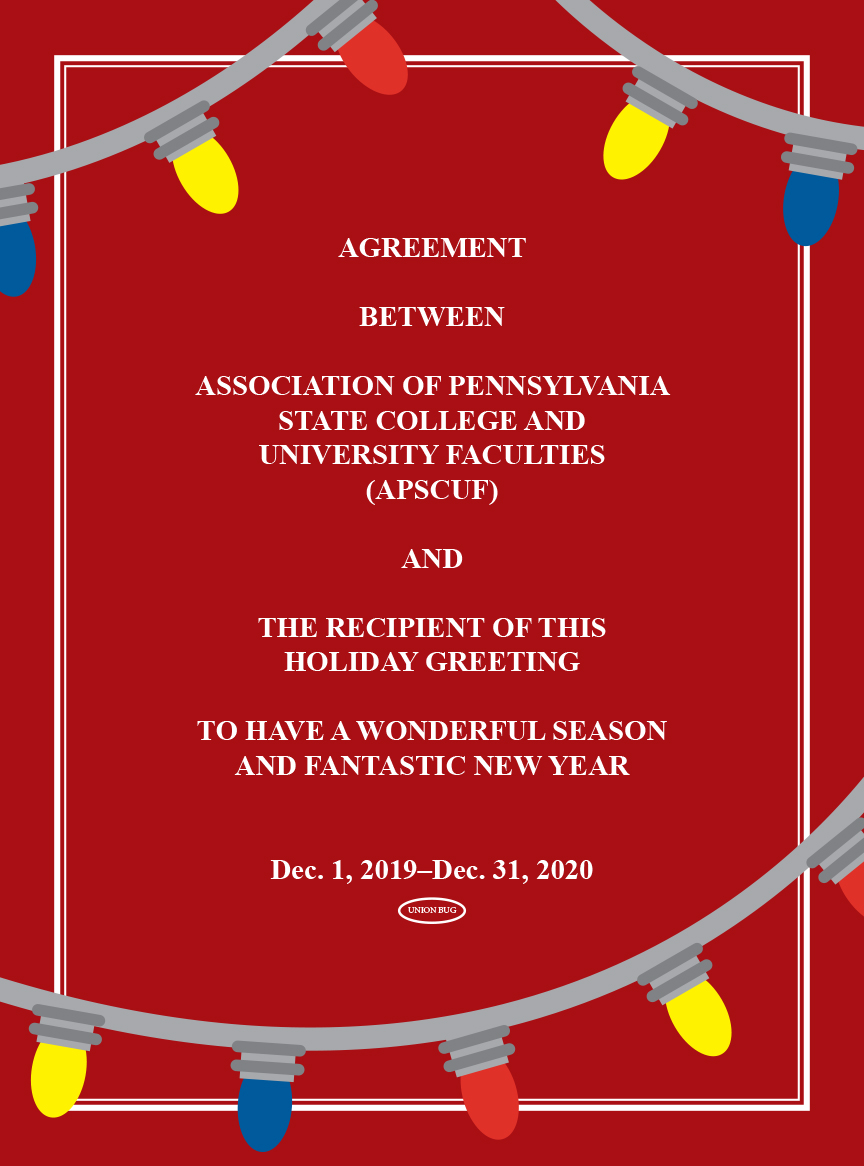
State System ratifies APSCUF faculty agreement
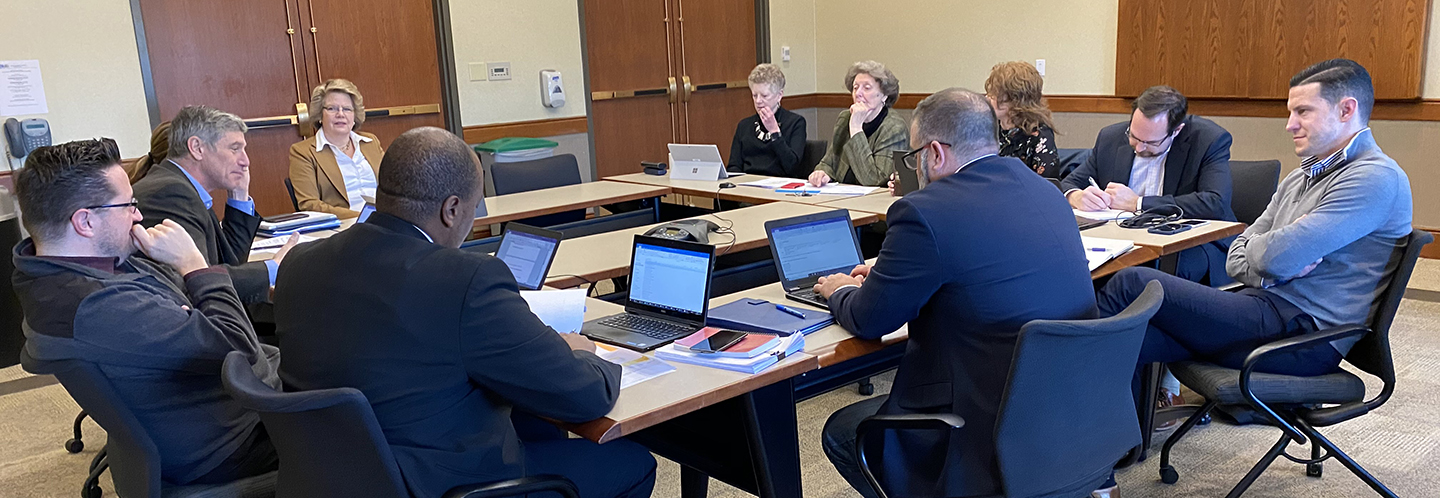
Pennsylvania’s State System of Higher Education’s Board of Governors ratified the APSCUF collective bargaining agreement Dec. 11 via conference call hosted at Dixon University Center in Harrisburg. Photo/Kathryn Morton
Pennsylvania’s State System of Higher Education’s Board of Governors today ratified the APSCUF faculty collective bargaining agreement via conference call. Click here to view the joint press release. The contract in its entirety will be posted in the coming days.